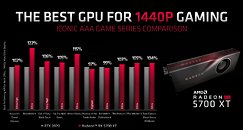It's been extensively reported that Denuvo
has failed as an effective DRM solution for games, as some of the newer releases such as "Assassin's Creed: Origins," were cracked by pirates less than 48 hours into the market release. For those who bought the game, Denuvo adds its own CPU and memory footprint. In an effort to stem further piracy of "Assassin's Creed: Origins" (because hey, there are limited stocks of pirated copies on the Internet), Ubisoft added an additional DRM layer on top of Denuvo, made by VMProtect. The implementation is so shoddy, that paying customers who didn't spend a fortune on their PC builds (most PC gamers) complain of abnormally high CPU usage, which is in some cases, even reducing performance to unplayable levels.
Ubisoft deployed VMProtect as a concentric DRM layer to Denuvo. Genuine user authentication has to now be performed by two separate pieces of software with their own PIDs, CPU-, and memory-footprints, not to mention user data falling into more hands. Gamers such as
this one took to Steam Forums to complain about abnormally high CPU usage, which is traced back to VMProtect. Gamers complain that the game now hits 100% CPU usage, resulting in frame-drops, stuttering, and even unplayable frame-rates. As gaming prophet Gabe Newell once said, the only way to beat piracy is to offer a better service than the pirates. Right now the pirates offer better frame-rates, at an introductory price of $0, while stocks last.

























































